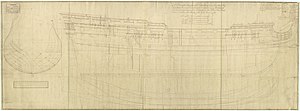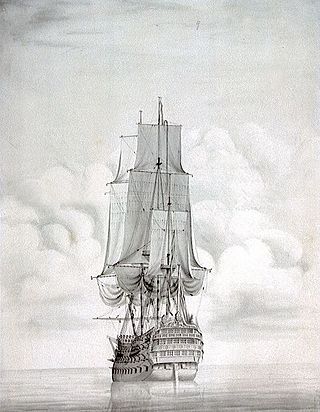
HMS Vanguard was a 90-gun second-rate ship of the line of the Royal Navy, built at Portsmouth Dockyard and launched in 1678.

HMS Royal Oak was a 74-gun third-rate ship of the line of the Royal Navy, built by Jonas Shish at Deptford and launched in 1674. She was one of only three Royal Navy ships to be equipped with the Rupertinoe naval gun. Life aboard her when cruising in the Mediterranean Sea in 1679 is described in the diary of Henry Teonge.
HMS Greenwich was a 54-gun fourth-rate ship of the line of the Royal Navy, built by Christopher Pett at Woolwich Dockyard and launched in 1666.

HMS Falkland was a 50-gun fourth-rate ship of the line of the Royal Navy, built by Holland of New Castle, New Hampshire, and purchased by the navy in 1696.

HMS St Michael was a 90-gun second rate ship of the line of the Royal Navy, built by John Tippetts of Portsmouth Dockyard and launched in 1669.
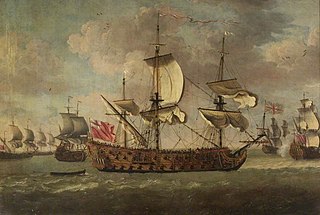
HMS Swiftsure was a 70-gun third-rate ship of the line of the Royal Navy, built by Sir Anthony Deane at Harwich, and launched in 1673. By 1685 she had been reduced to a 66-gun ship.

HMS Oxford was a 54-gun fourth-rate ship of the line of the Royal Navy, built by Francis Baylie in Bristol and launched in June 1674. Her guns comprised twenty-two 24-pounders on the lower deck, with twenty-two large sakers (8-pounders) on the upper deck and ten smaller sakers (5-pounders) on the quarterdeck.

President was a 38-gun fourth rate frigate of the Royal Navy, originally built for the navy of the Commonwealth of England by Peter Pett I at Deptford Dockyard, and launched in 1650.

HMS Boyne was an 80-gun third-rate ship of the line of the Royal Navy, launched at Deptford Dockyard on 21 May 1692.

HMS Humber was an 80-gun third rate ship of the line of the Royal Navy, launched at Hull on 30 March 1693.

HMS Canterbury was a 60-gun fourth-rate ship of the line of the Royal Navy, launched at Deptford on 18 December 1693.
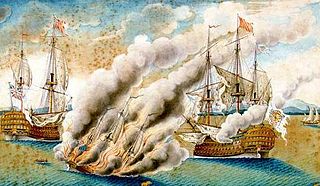
HMS Namur was a 90-gun second rate ship of the line of the Royal Navy, launched at Woolwich Dockyard in 1697.
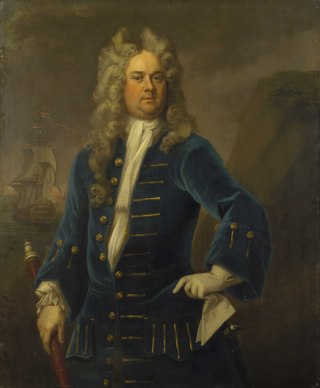
HMS Chatham was a 50-gun fourth rate ship of the line of the Royal Navy, the first of five such ships to be ordered in 1690. The Chatham was built by Master Shipwright Robert Lee at the eponymous dockyard, and launched on 20 October 1691. She was designed to the same lines as Lee's previous 50-gun ship, the Sedgemoor of 1687 - her specification was for a length of 123 ft, breadth of 34ft 3in and depth in hold of 13ft 9in, although she measured very slightly more on completion.

HMS Mary was a 60-gun fourth rate ship of the line of the Royal Navy, built at Chatham Dockyard and launched on 12 May 1704.
HMS Kent was a 64-gun third rate ship of the line of the Royal Navy. She was ordered from Deptford Dockyard on 10 May 1743 and was built by Joseph Allin the younger to the 1741 proposals of the 1719 Establishment, and was launched on 10 May 1746. Her first commander was Thomas Fox, who had previously commanded HMS Newcastle.

HMS Grafton was a 70-gun third rate ship of the line of the Royal Navy. She was built by Swallow and Fowler, of Limehouse, London, to the dimensions of the 1706 Establishment, and was launched on 9 August 1709.

HMS Lion or Lyon was a 60-gun fourth rate ship of the line of the Royal Navy, built at Chatham Dockyard to the 1706 Establishment and launched on 20 January 1709.

HMS Chester was a 50-gun fourth rate ship of the line of the Royal Navy, built at Chatham Dockyard to the 1706 Establishment of dimensions, and launched on 18 October 1708. Chester was placed on harbour service in 1743 and was broken up in 1749.
HMS Romney was a 50-gun fourth rate ship of the line of the Royal Navy, built by Sir Joseph Allin to the 1706 Establishment at Deptford Dockyard, and launched on 2 December 1708.

HMS Ruby was a 50-gun fourth rate ship of the line of the Royal Navy, built at Bursledon in Hampshire to the dimensions specified in the 1741 proposals of the 1719 Establishment, and launched on 3 August 1745.
